
Easy to Peel Oven-Roasted Chestnuts

If you have ever wondered how to cook chestnuts at home, this Oven-Roasted Chestnuts Recipe would be a perfect option. While you could boil or steam chestnuts, baking them in the oven gives them a roasted flavor that is simply divine! They can also be eaten on their own as a snack or side dish as well. To make these baked chestnuts, you begin by making a slit in the chestnut skins and then soaking them in water for 2 hours. Then, the chestnuts are drained and patted dry before being roasted in the oven. Once they are roasted, they should be soft and easy to peel.
What are Oven Roasted Chestnuts?
Oven roasted chestnuts are basically chestnuts that have been roasted as they are, which softens the flesh and the skins, and makes them easy to peel. Chestnut trees grow across the world in places like Asia, Europe, and the United States, and they produce chestnuts, which have a prickly coating. Chestnuts are commonly sold without their external coating, however, they still have a brown skin that needs to be removed to reveal the inner flesh. Rather than have a significant fat content like other types of nuts (cashews, almonds, etc.), chestnuts are lower in fat and starchier in texture.
These oven roasted chestnuts offer an easy way of cooking chestnuts at home. Once done, they can be used in whatever dishes you prefer.
Pro Tips
- It is important to make a horizontal cut in each chestnut to ensure they can be peeled easily once baked. Just don’t cut into the chestnuts so far that you pierce the chestnut flesh itself.
- Make sure you thoroughly dry the chestnuts after they soak to ensure that they roast rather than steam in the oven.
- If you are serving the chestnuts as a side dish, feel free to season them with some salt once they are peeled.
- When shopping for chestnuts, look for ones that are shiny in appearance and feel heavy for their size.
Do I Really Have to Soak The Chestnuts?
Soaking chestnuts before baking helps to soften their tough outer shells, making them easier to peel after cooking. It also helps reduce the risk of them bursting while roasting, ensuring a smoother cooking process and a better texture.
Where Can I Buy Chestnuts?
In the U.S., chestnuts can be found at most grocery stores, especially during the fall and winter months. They're often available at larger chains like Whole Foods, Trader Joe's, and Walmart. You can also find them at specialty food stores, farmers' markets, or order them online from retailers like Amazon or Chestnut Hill Farm. Fresh chestnuts are typically sold in the produce section, while roasted or pre-packaged chestnuts may be found in the snack or frozen food aisles.
What to Serve with Oven Roasted Chestnuts?
These oven roasted chestnuts can be served as a side dish with any meal or added into different dishes. Once cooked, they can be ground into a flour and added into cake, or they can be tossed into stir-fries or stuffings for poultry.
How Do I Know the Chestnuts are Done?
You will know the chestnuts are done when they smell fragrant and are easy to peel. If you open one up, the flesh should seem soft as well.
Can I Add Seasonings to the Chestnuts?
Yes, you definitely could! Once the chestnuts are peeled, feel free to toss them with whatever seasonings you enjoy such as sea salt, pepper, cayenne, or dried herbs. You could also toss them with some melted butter.
Why Do You Have to Cook Chestnuts?
You actually can eat chestnuts raw but they have a slightly astringent taste when they are raw. Roasting them in the oven is beneficial as it helps soften the skins to make them easier to peel. It also softens the flesh and makes it sweeter than it would be otherwise.
Why Are My Chestnuts So Hard to Peel?
Chestnuts can be difficult to peel because of their tough outer shell and the thin, papery inner skin (the pellicle) that clings tightly to the nut. If they aren’t cooked properly or if they’re too dry, the skin can become even harder to remove. Soaking the chestnuts before roasting softens the outer shell and the inner skin, making the peeling process easier.
How to Store Oven Roasted Chestnuts
These chestnuts should be stored in the fridge until you are ready to use them. They should keep for up to 4 days in an airtight container in the fridge.
Ingredients
How to Make Oven Roasted Chestnuts
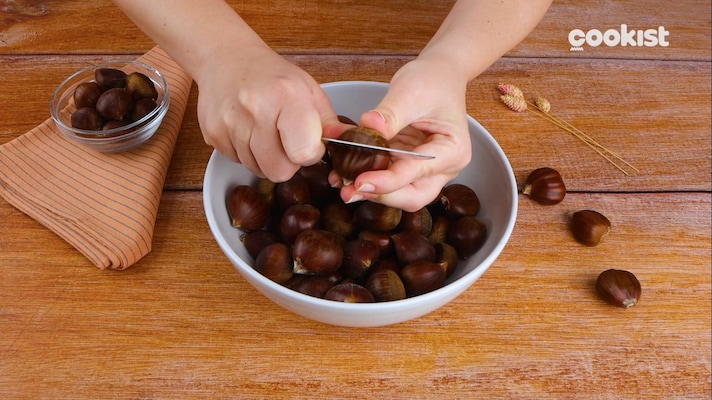
Step 1: Make a horizontal cut in each chestnut, being sure not to cut them all the way through.
Step 1: Make a horizontal cut in each chestnut, being sure not to cut them all the way through.
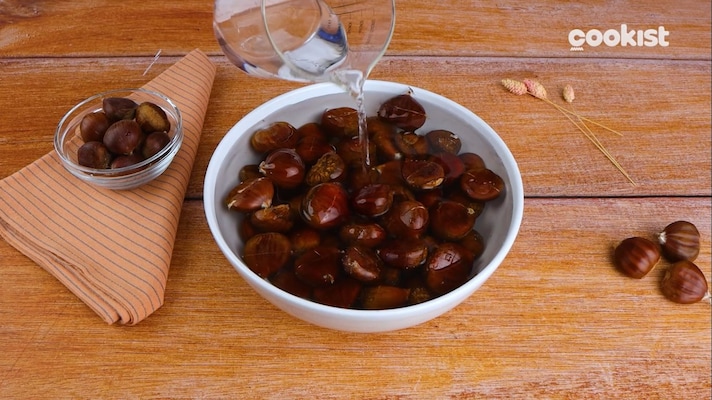
Step 2: Transfer the chestnuts to a bowl, cover them with water, and allow them to soak for 2 hours.
Step 2: Transfer the chestnuts to a bowl, cover them with water, and allow them to soak for 2 hours.
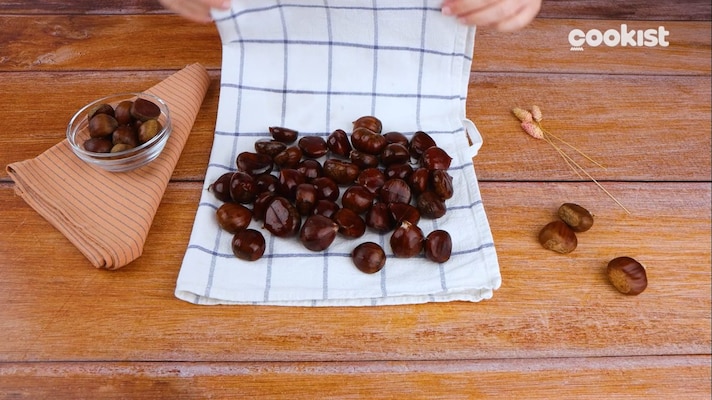
Step 3: After 2 hours, drain the chestnuts, place them on a towel, and pat them dry.
Step 3: After 2 hours, drain the chestnuts, place them on a towel, and pat them dry.
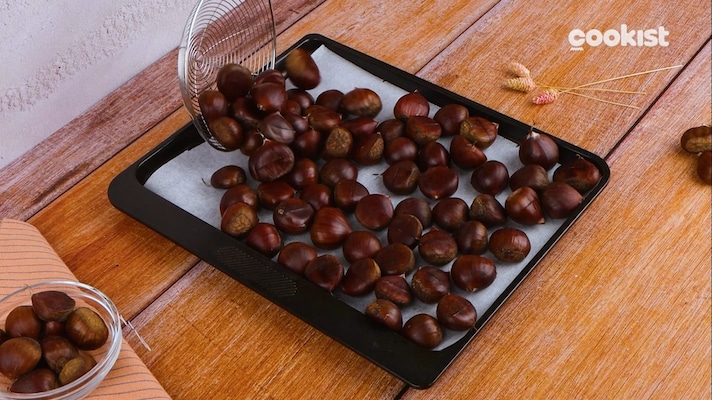
Step 4: Place the chestnuts on a parchment-lined baking sheet. Roast them in a 180°C (360°F) oven for 25 minutes.
Step 4: Place the chestnuts on a parchment-lined baking sheet. Roast them in a 180°C (360°F) oven for 25 minutes.
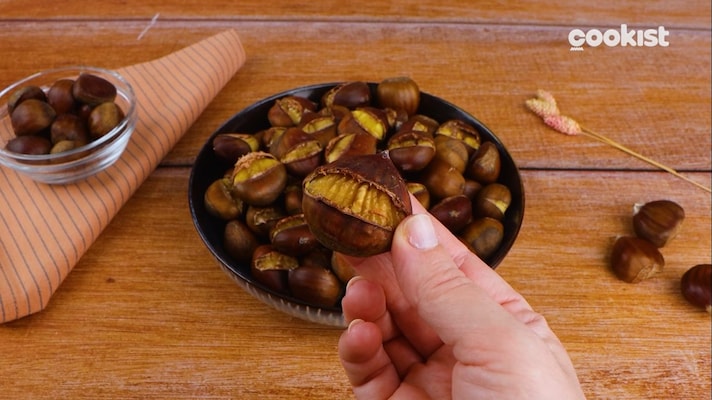
Step 5: Serve the chestnuts in a bowl, and peel and enjoy them!
Step 5: Serve the chestnuts in a bowl, and peel and enjoy them!
;Resize,width=767;)



